![]() — หน้าแรก — เกาะติดข่าว
— หน้าแรก — เกาะติดข่าว
ข่าวเศรษฐกิจและธุรกิจประจำสัปดาห์
-
Myanmar government hired German consultant firm Roland Berger for to oversee tendering processes “Swiss Challenge” on Yangon megacity project
The Myanmar government has awarded a contract to German consulting firm Roland Berger to oversee a so-called “Swiss challenge” tendering process for a new industrial park and related infrastructure in Myanmar’s commercial capital, Yangon. The tender process for the development, which is part of China’s huge New Yangon City project, is likely to be conducted after the November general election, based on the review period cited by the company. New Yangon City is one of the local backbone projects for Chinese President Xi Jinping’s vast Belt and Road Initiative (BRI) to construct an international infrastructure network. Xi has pushed for the implementation of the New City project, branding it a pillar of the China-Myanmar Economic Corridor (CMEC), a key component of the BRI. The Ministry of Investment and Foreign Economic Relations (MIFER) announced on Saturday that the government had signed an agreement with Roland Berger Co. Ltd. to provide consulting services to finalize a Swiss challenge tendering process for the “new industrial park and essential ancillary infrastructure.” -

Individual border trades through border gate exceeded K 34 billion in the ten months of current 2019 – 2020 financial year
Trade conducted by Individual Trading Card (ITC) holders touched K37.8 billion through the borders in the ten months of the 2019-2020 financial year, according to the data released by the Ministry of Commerce. The Trade Department issued 61 cards in October-July period, and the cardholders conducted trade worth K37.8 billion. While imports exceeded K35.23 billion, exports were valued at just K2.6 billion. The Myawady border recorded the highest trade value at K24.7 billion in the current FY, according to the Commerce Ministry. But, the figure only reflects imports as individual trading cardholders did not export goods through the Myawady border. -
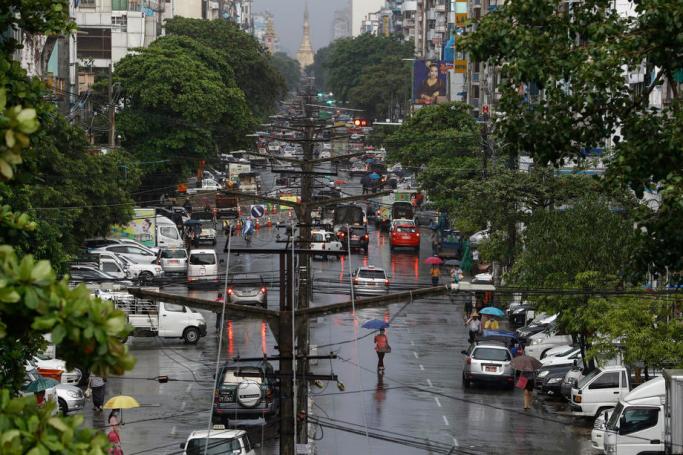
Foreign direct investment (FDI) of over US$1.67 billion has flowed from eight enterprises into the power sector in the past ten months of the current financial year, state media reported quoting the DICA (Directorate of Investment and Company Administration statistics). The quantum of investment in power is higher than in any other sectors. Myanmar has fetched over $5 billion inflows of FDI, including the expansion of capital and investments in the Special Economic Zones during the October-July period. The Myanmar Investment Commission (MIC) and the investment committees of states and regions have allowed 219 enterprises to invest in the country.
Foreign direct investment (FDI) of over US$1.67 billion has flowed from eight enterprises into the power sector in the past ten months of the current financial year, state media reported quoting the DICA (Directorate of Investment and Company Administration statistics). The quantum of investment in power is higher than in any other sectors. Myanmar has fetched over $5 billion inflows of FDI, including the expansion of capital and investments in the Special Economic Zones during the October-July period. -

The export value of aquatic products increased over USD $ 114 million in the 11 months of current financial year when compared to the same period of previous year
The export value of marine products from 1 October to 21 August in the current financial year(FY) hit about US$780 million, an increase of over $114 million compared to that of last FY, according to the statistics released by the Commerce Ministry. During the past 11 months of this FY, the aquatic exports fetched $778.3 million whereas the export value of fisheries last year was $663.94 million, according to the Ministry of Commerce. Myanmar exports aquatic products such as fish, prawn and crab to over 40 countries including China, Saudi Arabia, Japan and Thailand. -
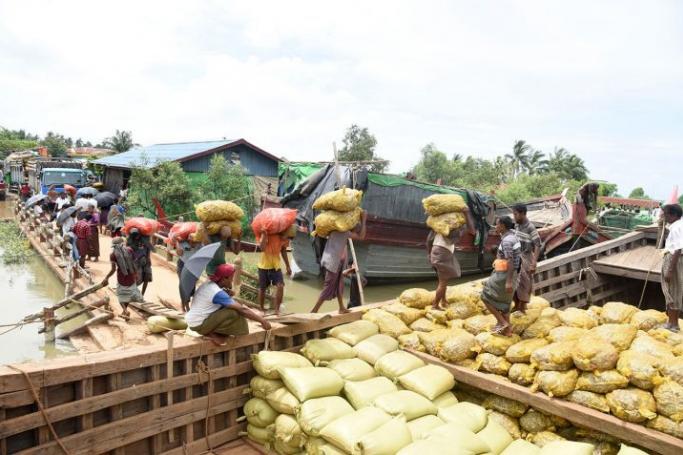
Myanmar – Bangladesh border trade increased as of 21 August in the 2019 – 2020 current financial year
A report from the Ministry of Commerce says the border trade between Myanmar and Bangladesh hit US$748.36 million as of 21 August in the current financial year of 2019-2020, according to a report by the Global New Light of Myanmar. According to statistics, the border trade during this period has seen a dramatic jump, increasing by $727 million, compared with that of the same period last year when the total bilateral border trade was only $21.03 million. -
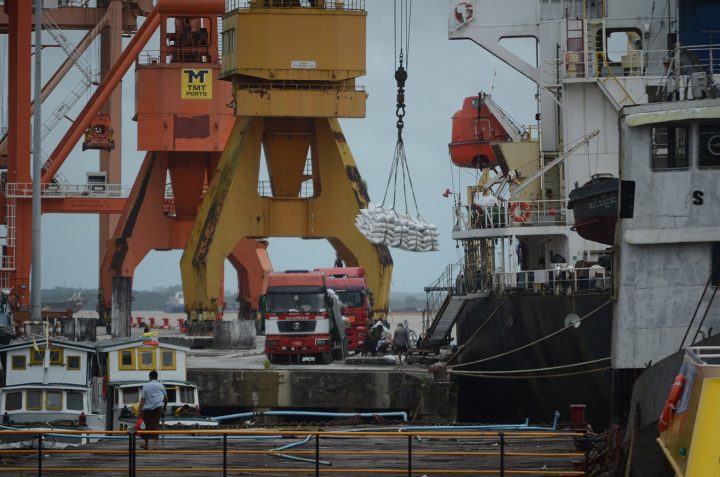
The value volume of rice export meets target in this year despite export volume via border routes dropped
Although the volume of rice export via border route dropped, Myanmar met the export target in 2019-2020 financial year, said Vice-Chairperson U Aung Than Oo of Myanmar Rice Federation (MRF). MRF targeted to export 2.4 million tonnes of rice and broken rice this FY. Myanmar has shipped over 2.4 million tonnes of rice and broken rice including 625,214 tonnes via border route and 1.8 million tonnes of rice and broken rice via sea route from 1 October to 21 August this FY. The export of rice met the target this FY thanks to the rising volume of rice export via sea route, according to MRF. The rice export volume dropped via land border route after China had granted export of rice through a legitimate trade channel, he added. -

Myanmar trade deficit surged to USD $ 1.54 billion as of 21 August in the 2019 – 2020 financial year
Myanmar trade gap has significantly surged to US$1.54 billion as of 21 August in the current financial year 2019-2020 from over $1 billion registered in the corresponding period of the 2018-2019FY, according to the data provided by the Ministry of Commerce. Between 1 October and 21 August in the current FY, Myanmar’s external trade increased to over $33 billion from $31.2 billion recorded in the year-ago period. While exports were estimated at $15.7 billion, imports were valued at $17.27 billion. Compared to the previous FY, exports showed an increase of $637.69 million, while imports climbed up by $1.165 billion. Myanmar’s foreign trade has shown a 10-per-cent increase, year over year, under the incumbent government. Myanmar exports agricultural products, animal products, minerals, forest products, and finished industrial goods, while it imports capital goods, intermediate goods, CMP raw materials, and consumer goods. The country’s export sector relies more on the agricultural and manufacturing sectors. While export earnings from the CMP (cut, make, and pack) garment businesses are rising, the country’s reliance on natural resources, such as natural gas and jade, is lessening. -
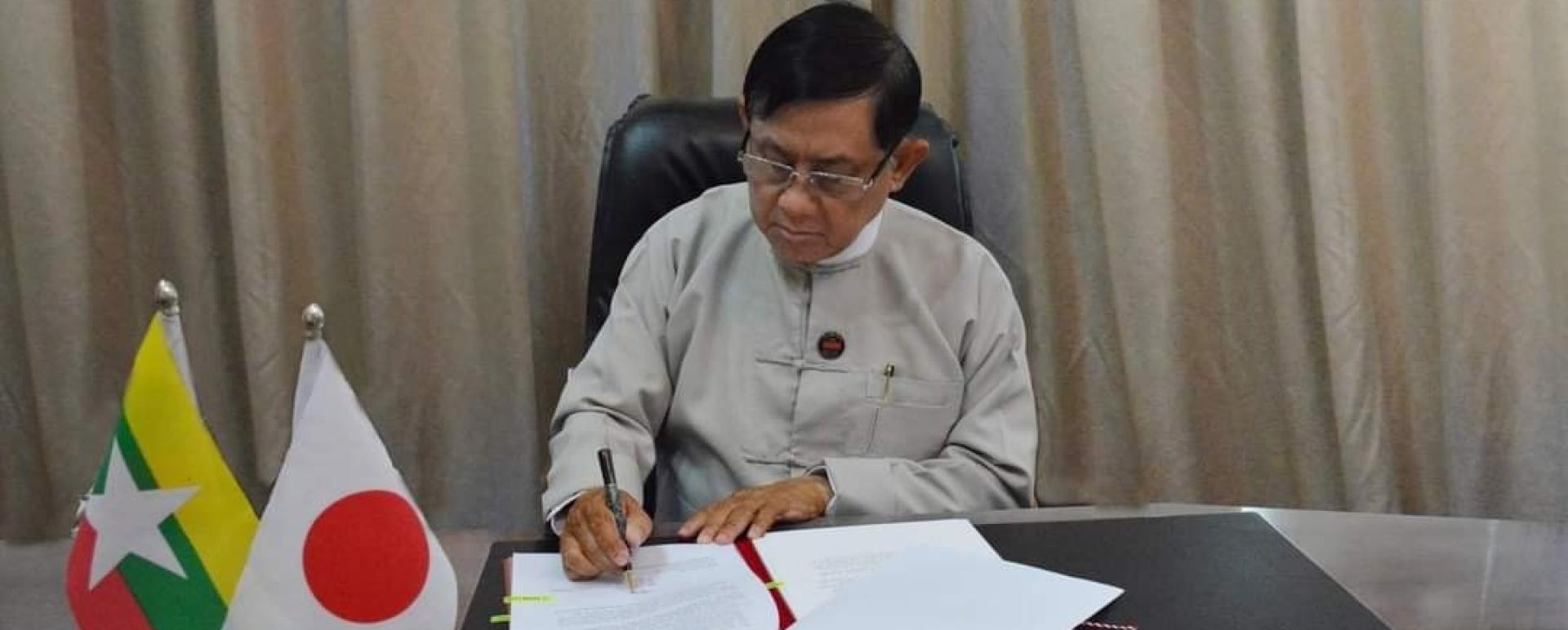
Japanese government provides emergency loan to use in the response crisis over COVID – 19 pandemic in Myanmar
With the aim to response crisis over COVID-19 pandemic in Myanmar, bilateral agreement to give emergency loans worth about US$180 million was signed between Myanmar and Japan on September 1st, according to the announcement from Japan Embassy in Myanmar. Japanese ambassador to Myanmar Ichiro Maruyama and Deputy Minister of Finance and Industry Maung Maung Win signed an agreement and exchanged it. The Japanese government was very proud of Myanmar’s efforts into control of COVID-19 virus and then Japan will be helping with economic projects concerning COVID-19 disease and COVID-19 Economic Relief Plan. The loans will be low-interest and the appropriate grace period including suspension period will be 40 years. -
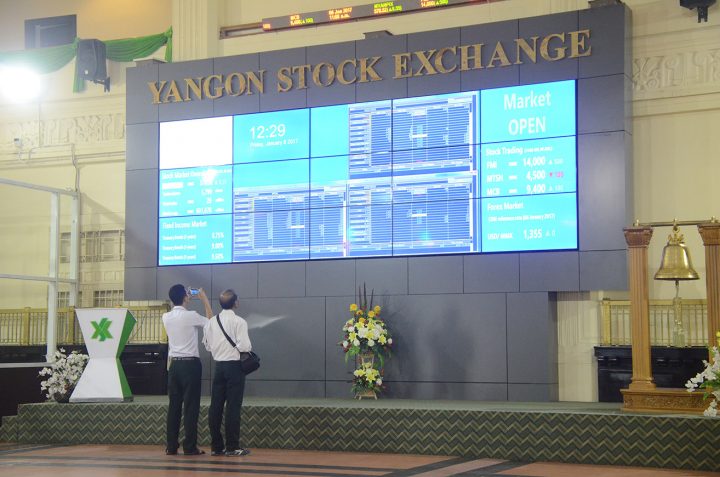
The value of shares trading on the Yangon Stock Exchange (YSX) decreased in the August of this financial year
The value of shares traded on the Yangon Stock Exchange (YSX) in August sank to the lowest level of K747 million this year, according to YSX’s monthly report. The trading volume also plunged to an eight-month low of 118,850 shares in August. The stock markets worldwide have reported their largest declines since the 2008 financial crisis. Similarly, the local equities market is also scared by the COVID-19 crash, and a market observer points out. Moreover, Myanmar people like to invest in property, currency and gold market. Most of the local people are accustomed to investing in the gold market rather than the stock market. They will buy them if they have extra money. The cash out when they need, he added. In a bid to contain the spread of COVID-19 and promote the development of Myanmar capital market through the digital platform, the first Online Exhibition and Live Seminar YSX Expo 2020 will go live on 12 and 13 September 2020. Those interested can make registration through https://ysx.expo2020.online/. The expo will include more than ten digital booths of listed companies and securities companies, live panel discussion to cover economic and investment situation, investors’ perspective amid the COVID-19 crisis and situation of foreigners’ participation in Myanmar capital market, interview talk with executives of the listed companies, lucky draw program and free online stock trading account opening, the YSX stated. -

The number of companies registered on the MyCo exceeded over 9,300 in the past eight months of current financial year
The number of companies registered on the online registry system, MyCO, reached over 9,300 in the past eight months (Jan-Aug) 2020, according to the Directorate of Investment and Company Administration (DICA). The registration and re-registration of companies on the MyCO website commenced on 1 August 2018, in keeping with the Myanmar Companies Law 2017. Typically, over 1,000 new companies are registered every month. This year, the figures of registered companies stood at 1,415 in January, 1,298 in February and 1,015 in March, only 348 companies in April, 798 in May, 1,314 in June, 1,650 in July and 1,551 in August, as per data of the DICA. At present, 100 per cent of the applicants are using the online registration platform, according to data provided by the DICA.
เกาะติดข่าว
Copyright © 2014 Business Information Center All Rights Reserved.







